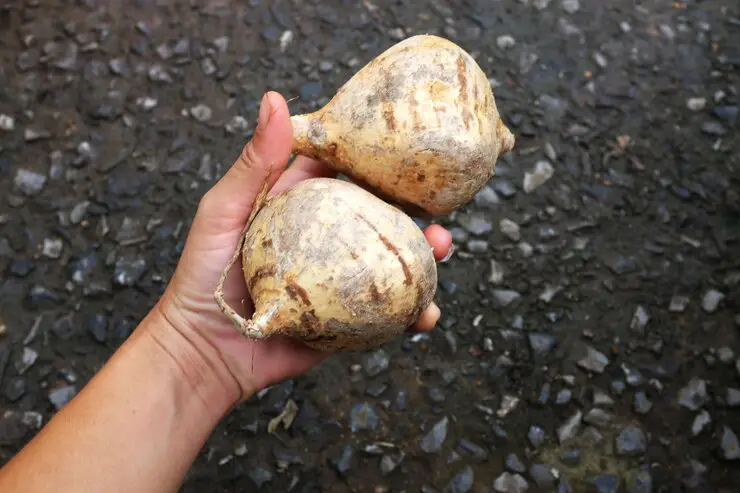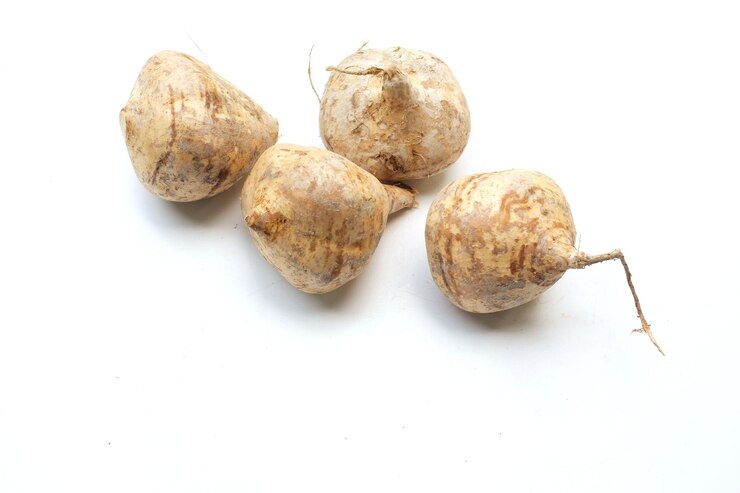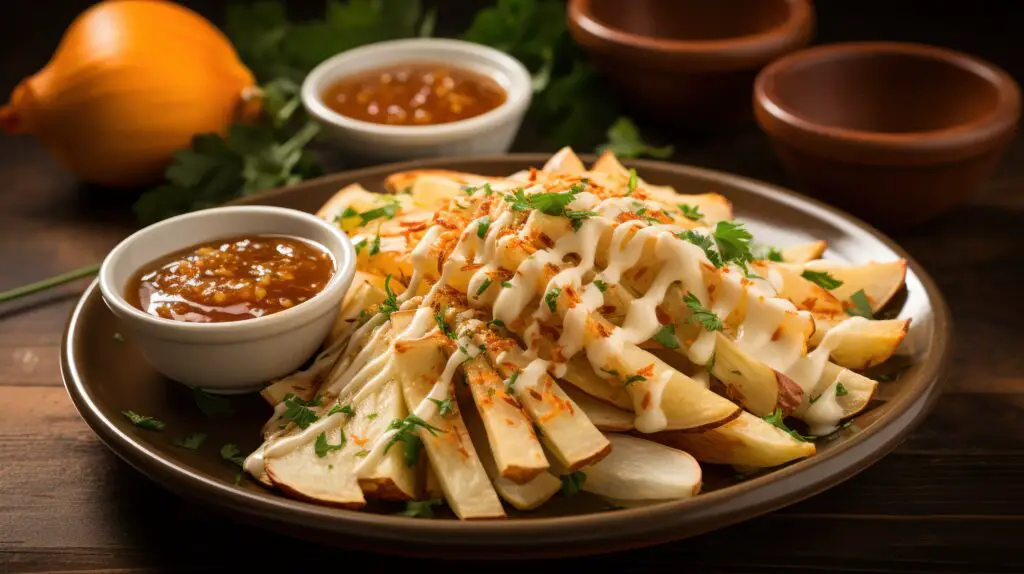Introduction
Many cat owners are puzzled when it comes to the unusual question, “Can cats eat jicama?”. It is not well known in the world of feline diets that jicama is a root vegetable that is viewed with curiosity. It is an intriguing prospect for cat treats because of its unique nutritional profile and crunchy texture. What about our furry friends? Is it safe for them?
The answer is yes; cats can eat jicama. But there is no simple answer to this question. Even though jicama is not toxic, due to cats’ carnivorous nature, it may not be the best choice for them.
By investigating this topic, we resolve the mysteries related to giving jicama to cats. This article covers the safest way to include this crunchy vegetable in your cat’s diet, along with preparation tips and nutritional data. So, let’s get started.
Table of Contents
Nutritional Profile of Jicama
Key Nutrients in Jicama
Jicama, often overlooked in the produce aisle, is a nutritional powerhouse. This crunchy root is low in calories yet rich in essential nutrients. It boasts a high water content, making it a hydrating snack option. Packed with dietary fiber, jicama supports digestive health, which can be beneficial for cats prone to hairballs or digestive issues. It’s also a good source of vitamin C, although this is more a human benefit, as cats produce their own vitamin C.
Comparing Jicama’s Nutrients with Cats’ Dietary Needs
Cats are obligate carnivores, meaning their diet should primarily consist of meat. Their bodies are designed to process animal proteins and fats, not high-fiber veggies like jicama. While the fibre in jicama is great for humans, for cats, it’s a different story. Cats don’t need a lot of fibre in their diet. Too much can lead to digestive problems.
So, while jicama isn’t harmful, its nutritional benefits don’t align perfectly with what cats need. The occasional small piece might be a fun snack for your cat, but it should be just that—occasional. The mainstay of a cat’s diet should be high-quality cat food formulated to meet their specific nutritional requirements.
Can Cats Safely Eat Jicama?

Image Credit: Freepik
Understanding Cats’ Dietary Requirements
Cats are fascinating creatures with specific dietary needs that differ significantly from ours. As obligate carnivores, their bodies are finely tuned to derive nutrition mainly from animal-based proteins. This specialisation in their diet means that while they can consume a variety of foods, their primary nutrient sources should always be meat-based. Their digestive systems are not designed to break down large amounts of plant material, making some human foods, including certain vegetables, less suitable for them.
Interesting Topic: Can Cats Eat Canned Crab Meat?
Is Jicama Safe for Cats and Kittens?
So, where does jicama fit into this picture? The good news is that jicama is not toxic to cats. This means that if your cat sneaks a bite of this crunchy vegetable, there’s no need for immediate concern. However, ‘not toxic’ doesn’t necessarily mean ‘ideal.’ Jicama’s nutritional profile, while beneficial for humans, doesn’t offer significant benefits to cats.
For kittens, the story remains the same. Their developing bodies and digestive systems are even more sensitive, so it’s crucial to adhere strictly to age-appropriate, meat-based diets. Introducing unfamiliar foods like jicama could disrupt their delicate digestive balance.
In essence, while a small piece of jicama won’t harm your cat or kitten, it’s not something that should be a regular part of their diet. Cats don’t need the nutrients jicama offers, and it certainly can’t replace the essential components they get from meat. If you’re keen on treating your cat with jicama, do so sparingly and always observe their reaction to it. When in doubt, it’s best to stick to tried-and-true cat treats and foods that are specially formulated for their carnivorous needs.
Potential Benefits of Jicama for Cats
Health Perks: Fibre, Vitamins, and Hydration
While jicama might not be a staple in a cat’s diet, it’s not without its perks. This crunchy vegetable is known for its high water content, which can aid in keeping your cat hydrated, especially on hot days or for cats that are notoriously poor drinkers. Hydration is crucial for maintaining healthy kidney function and overall well-being in cats.
The dietary fibre in jicama can also be beneficial, albeit in very small amounts. It can aid in digestion and help prevent constipation, a common issue in cats. However, it’s important to remember that cats require a very different type of fibre than humans do, and too much can be problematic.
Can Jicama Aid in Weight Management for Cats?
For cats that are overweight, the low-calorie nature of jicama might seem like an attractive treat option. However, it’s essential to approach weight management in cats with a holistic strategy that focuses on a proper cat-specific diet and exercise rather than relying on human foods like jicama.
Risks and Downsides of Feeding Jicama to Cats
Digestive Concerns: When Jicama Can Be Harmful
The primary concern with feeding jicama to cats lies in its fibre content. Cats have a limited ability to digest large amounts of fibre. Overfeeding jicama can lead to digestive upset, including diarrhoea or bloating, which could be uncomfortable for your pet.
Precautions and Allergic Reactions to Watch Out For
Like with any new food, there’s always a risk of allergic reactions. Signs of an allergic reaction in cats include itching, swelling, or digestive upset. If you notice any of these symptoms after feeding jicama to your cat, it’s best to discontinue its use and consult your vet.
In conclusion, while jicama can be a safe, occasional treat for cats, it’s important to be mindful of its benefits and limitations. The high fiber content, while beneficial in small quantities, can be harmful if overdone. As always, the best approach is moderation and close observation of how your cat reacts to this crunchy veggie. Remember, when it comes to your cat’s diet, their specialized carnivorous needs should always take center stage.
Feeding Jicama to Cats: Best Practices

Image Credit: Freepik
When it comes to incorporating jicama into your cat’s diet, there are a few best practices to follow. These guidelines help ensure that your cat enjoys this treat safely and healthily.
How to Prepare Jicama for Your Cat?
Firstly, the preparation of jicama is key. Always peel the jicama before offering it to your cat. The skin can be tough and difficult to digest, not to mention it may contain residues or chemicals from farming practices. Cut the jicama into small, manageable pieces that your cat can easily chew and swallow. This reduces the risk of choking and makes it easier for their digestive system to handle.
Serving Sizes and Frequency
Moderation is crucial when feeding jicama to cats. Given its high fiber content, it should be offered in small quantities to avoid digestive issues. A small piece of jicama as an occasional treat is more than enough for your feline friend. It’s also advisable to introduce it slowly into their diet to monitor how they react to this new food.
Exploring Alternatives: Other Safe Treats for Cats
Diversifying your cat’s treat options beyond jicama is not only fun but can also contribute to their overall health and happiness. While jicama can be a unique snack, there are plenty of other safe and potentially more beneficial treats to explore.
Comparing Jicama with Other Root Vegetables
Root vegetables like carrots or sweet potatoes, in small, cooked quantities, can be a healthier alternative to jicama. These veggies are often more digestible for cats when cooked and mashed. However, remember, like jicama, they should only be served in moderation due to their high carbohydrate content.
Healthy Snack Options Beyond Jicama
For a more species-appropriate treat, consider lean meats like chicken, turkey, or beef, which can be cooked and cut into small pieces. These are not only delicious for your cat, but they also provide the protein they require. Commercial cat treats, specifically formulated for felines, are another safe option. They are often fortified with vitamins and minerals, making them a nutritious choice.
Interesting Topic: Can Cats Eat Lychee?
Expert Insights and Vet Recommendations
Incorporating new elements like jicama into a cat’s diet often leads to seeking advice from those in the know. Vets and feline nutrition experts can provide valuable insights, ensuring that any dietary changes or additions are beneficial and safe for your cat.
Latest Veterinary Advice on Jicama and Cats
Veterinarians generally agree that jicama is not harmful to cats, but they also stress that it should be given as a treat and not as a staple in their diet. Their primary recommendation is to always prioritize a cat’s specific nutritional needs, which revolve around high-quality, protein-rich, meat-based foods. Vets also advise that any new food, including jicama, should be introduced slowly and in small quantities to monitor how your cat reacts.
Continuing Research and Evolving Guidelines
The world of pet nutrition is continuously evolving, with ongoing research shedding new light on what is best for our feline companions. Vets keep up-to-date with this research and can offer the most current recommendations based on the latest findings. This includes insights into alternative treats and snacks that can supplement a cat’s diet in a healthy and enjoyable way.

Conclusion
In conclusion, the question of whether can cats eat jicama has been explored, revealing that while this crunchy root vegetable is not toxic to cats, it should be considered more of a novelty than a dietary staple. Cats, as obligate carnivores, have specific nutritional requirements centered around animal-based proteins and fats. While jicama can offer hydration and a touch of dietary fiber, its benefits are better suited to humans.
Cat owners should approach feeding jicama with caution, offering it sparingly and monitoring their cat’s reactions closely. To ensure the best nutrition for your feline companion, consult with your veterinarian and prioritize a diet that aligns with their carnivorous nature. With this balanced approach, you can keep your cat healthy and satisfied while indulging their curiosity with the occasional jicama treat.
FAQs: Can Cats Eat Jicama?
Can kittens eat jicama?
Jicama is safe and non-toxic for cats to eat, so the answer is yes. Jicama, a root veggie from the legume family, isn’t harmful. But remember, it’s not a nutritional substitute for their regular diet. It is always best to give it in small amounts as a treat.
What is the healthiest fruit for cats?
Cantaloupe is a good choice for a healthy fruit treat for cats. It’s tasty, safe, and low in calories. Additionally, it is a great source of beta-carotene and antioxidants, both of which are excellent for your cat’s skin and eyes.


